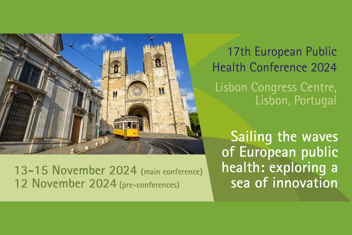The 17th European Public Health (EPH) Conference took place in Lisbon, Portugal, from November 12-15, 2024, bringing together public health professionals, researchers, and policymakers from across Europe. This year’s theme, “Sailing the waves of European public health: exploring a sea of innovation”, set the stage for crucial discussions on addressing current and emerging public health challenges. The JA PreventNCD project contributed to this significant event, by participating in four different scientific sessions during the conference.
Wednesday the 13th of November
On the opening day, JA PreventNCD organized two sessions.
Making WHO European Region the Healthiest Online Environment for children: Restrict harmful marketing
JA PreventNCD team working on regulation and taxation in collaboration with WHO Europe and the European Public Health Alliance (EUPHA) organized the scientific session, which highlighted the need to restrict exposure to harmful marketing practices, particularly those promoting unhealthy foods, beverages, and other commercial risks to children's well-being. Key points from the session included policy recommendations for reducing digital marketing risks to young people, collaborative approaches between governments, tech platforms, and public health agencies and showcased real-life examples of how online marketing shapes children's health behaviours and outcomes.
Health literacy in Europe: Building a comparative database for shaping public health policy
This workshop, co-organized by JA PreventNCD team working on social inequalities with WHO Europe, EUPHA-HL, and M-POHL (WHO Action Network on Measuring Population and Organizational Health Literacy), offered a deep dive into the M-POHL Health Literacy Survey (2024-2026), the most comprehensive Health Literacy Survey in Europe. The session also presented health literacy tools utilized in the process, including three measurement scales that covered digital, navigational and communicative health literacy.
Thursday, November 14
On the second day, JA PreventNCD played a role in two additional sessions:
Skills building seminar. Beyond the jargon: an interactive workshop for effective risk communication
Co-organized by JA PreventNCD team working on identifying individuals at risk (Sciensano), EUPHAnxt, and EUPHA-EPI, this interactive workshop featured WP10’s presentation on task 10.3, “Lessons Learned from COVID: Effective Health Communication in Crises and Beyond.” The participants worked through real-life scenarios, applying the WHO Strategic Communications Framework for effective communications to translate epidemiological text to a clear, concise key point message to communicate to the public. The session emphasized that in today’s information ecosystem, misinformation is inevitable. Health professionals must ensure the right information “comes out on top.”
Roundtable discussion: Primary prevention and management of NCDs – the added value of joint actions across Europe
The two Joint Actions, JA PreventNCD and JACARDI led the discussion. The Coordinator of JACARDI, Benedetta Armocida, discussed efforts to scale up initiatives addressing cardiovascular diseases and diabetes in Europe. The Scientific Coordinator of JA PreventNCD, Knut-Inge Klepp, outlined the efforts in prioritizing effective prevention strategies and policies to reduce the burden of cancer and NCDs. Together with an expert panel, the discussion highlighted the complementary roles of these two initiatives. While JA PreventNCD focuses on primary prevention and policy development, JACARDI emphasizes secondary prevention and strengthening health systems. Both projects align with Europe’s Beating Cancer Plan and the Healthier Together – EU NCD Initiative, working toward shared goals of equity, scalability, and sustainability while avoiding fragmentation or duplication of efforts.
Two key messages were highlighted in this session:
- Synergies and collaboration to drive policy development and foster increased capacity are the pillars to build a healthier Europe.
- Two large-scale Joint Actions drive impact by highlighting innovative NCD prevention strategies and fostering collaborative engagement.
The session underscored the importance of evidence-based practices and innovative policies in addressing NCD challenges while fostering resilience and health equity across Europe.
Reflections and Future Directions
The EPH Conference 2024 also provided an opportunity for JA PreventNCD to reflect on its achievements and reaffirm its goals for the future. Participation in this flagship event reinforced the significance of collaborative efforts to prevent and reduce the burden of NCDs across Europe. It also served as a reminder that addressing NCDs requires a systemic approach, combining public health innovation with strong political commitment.
As JA PreventNCD continues its work, events like the EPH Conference play a vital role in amplifying the project's mission and fostering synergies among stakeholders.
